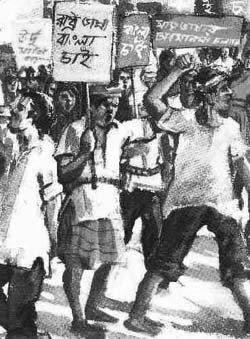Ekushey February - What really happened on the day

While recommending to the readers the must-read work of Badruddin Umar titled ‘Language Movement and the then Politics in East Pakistan’, I will narrate the calendar of events in capsule form, and leave the controversies for Umar’s historiography to dispel. February 21 of 1952 was a sequel to the embryonic identity-consciousness of 1948 when Curzon Hall in the science faculty had erupted into a loud protest over Mohammad Ali Jinnah’s assertion that Urdu would be the state language of Pakistan. Shamsur Rahman Selim, a young fresher, had shouted ‘no’ to Jinnah, turning the entire assembly astir in pandemonium. That was when the seed was sown and the students of the University had since gone on underscoring the demand by relentless organisational work. When Khwaza Nazimuddin, the then Prime Minister of Pakistan and a scion of the Dhaka Nawab family, once again iterated Urdu as the sole state language of Pakistan, at a public meeting on January 26, 1952 in Dhaka, the campus community of students rose in rebellion, struck classes on January 30, 1952, formed the All Party Students Action Committee, and called for a countrywide student strike on February 21.
A political vanguard, styled the All Party Action Committee barring the ruling Muslim League, gave the struggle a political face. But the vanguard was against any breach of governmental restrictions that were in place or likely to be imposed in the form of Section 144 in the city. The 10,000-strong rebellious student assembly at the legendary Amtala (the shade of the mango tree) at the old Arts Building overruled the All Party Action Committee directive and started to brave the streets, first in twos and fours, that soon turned into a huge stream of peaceful but determined demonstrators. Then suddenly a hail of bullets that was fired by the police on the orders of the district administrator felled several students and some bystanders near the Dhaka Medical College Students’ hostel.
What a day and what a cry that were. The death of Salam, Barkat, Rafique and Shafiur, among others, and the blanket arrests of the students from the place of occurrence and the vicinity of the entire Ramna enclosure of Dhaka city, lit the flames. It was a day of both sadness and courage, of mourning and turning the mourning into strength in full-throated slogans resounding in solemn pledge — Rashrtrabhasa Bangla Chai (we want Bangla as the state language). It won. But the wisp of flame lit by the students of Dhaka University soon became a prairie fire, so to speak, engulfing the land and the meadows of this Gangetic plain, laced by a thousand rivers, and finally culminated in the Liberation War that put Bangladesh on the map of the comity of nations.

Comments
Post a Comment